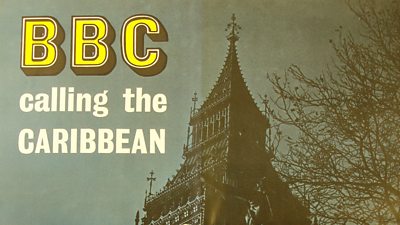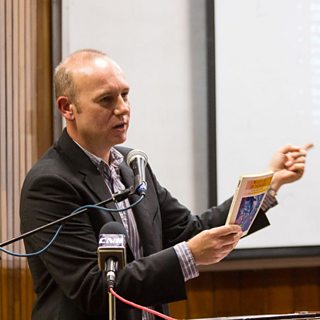The steady chimes of Big Ben that announced London Calling were regarded as the 'herald' of the Empire Service, a resounding echo from London’s imperial heart of unity and connectivity across a world falling apart. In the Christmas day broadcast below, the announcer urges listeners to 'girdle the earth with us' through the shared bonds of friendship, world harmony and the shrinking distances of global communication.
But it was not long before a listener in the West Indies was complaining that Big Ben’s noisy interruption of literary broadcasts meant a more appropriate name for overseas programmes might be "For Whom the Bell Tolls".

By the time of the Commonwealth Christmas Programme, West Indian literature on radio had come of age. In 1948, the ±«Óãtv’s Caribbean Voices programme doubled in duration as its audience of aspiring authors rapidly grew. The literary magazine series went on to produce a body of writing that is today acknowledged as an important catalyst for Caribbean cultural nationalism.
The expressive force of this literature on air was largely due to the new emphasis broadcasting placed, not just on what writers said, but on how they said it.
The Jamaican poet, Louise Bennett, was one of the first regular performers on Calling the West Indies after the war. Bennett’s sheer volubility represented a radical departure from the polite, cut glass restraint of ±«Óãtv received pronunciation, as the following interview from Woman’s Hour in 1976 suggests:
If, as the presenter notes, the kind of "dialect" that Bennett embraces "was much frowned upon during British rule", the ±«Óãtv provided an unlikely (given its penchant for "proper" pronunciation) channel for the unruly poetic forces of vernacular expression.
The poet and historian Kamau Brathwaite (another "Caribbean Voices" contributor), would later name this expression "nation language".
In the following excerpt from a programme presented by John Figueroa, a key contributor on Caribbean Voices, Figueroa reflects on the poetry to be heard in the "kinds of English used" on radio. Reading from Derek Walcott’s Tales of the Islands, he illustrates the subtle shifts in that poem as it moves from full-blown "dialect", or creole, to standard English:
Broadcasting did not just bring together a variety of voices, but of people from across the geographically dispersed Caribbean. The ±«Óãtv was known as a literary "headquarters" for many of these writers trying to make their names in the metropolis. Among them were the St Lucian Derek Walcott, the Barbadian George Lamming, the Trinidadian V.S. Naipaul, the Guyanese Edgar Mittelholzer, and the Jamaicans Una Marson, Sylvia Wynter and Louise Bennett.
It was in London that these artists experienced themselves becoming West Indian for the first time. At the same time, and as the examples below suggest, this new proximity among writers could also bring their differences into sharper focus.
Presented by Huw Wheldon, the following programme juxtaposes two of the giants of West Indian literature: Edgar Mittelholzer and George Lamming. Both were prominent names on Caribbean Voices.
Mittelholzer, was the first and most prolific of the post-war West Indian novelists. His acclaimed early novel, A Morning at the Office was first published by Leonard Woolf’s Hogarth Press in 1950, but he committed suicide fifteen years later when his controversial themes, which flirted with fascism, the occult and sadomasochism, effectively alienated his reading public:
George Lamming, the Barbadian novelist and intellectual is the author of influential books such as In the Castle of My Skin and The Pleasures of Exile. The latter is, in itself, an important meditation on the ±«Óãtv from a West Indian perspective:
Presenting Mittelholzer in the country (Farnham) and Lamming in London, the wider documentary reveals Mittelholzer as a writer who regards his work as transcending politics and the Caribbean, while Lamming describes his writing as inseparable from politics and the island of his birth. For Mittelholzer England feels as familiar as for Lamming it is alienating.
Filmed in 1960 for the ±«Óãtv arts programme, Monitor, this rare early footage of the two authors is also an important reminder that by the 1960s, West Indian artists were moving beyond radio and into the new visual media of television and film.
As race relations grew increasingly combative over the 1960s and 1970s, West Indians would increasingly demand to be seen, not just heard.
Professor James Procter is currently completing a monograph on West Indian and West African Writing at the ±«Óãtv for Oxford University Press.
Related links
-
Newcastle University project

